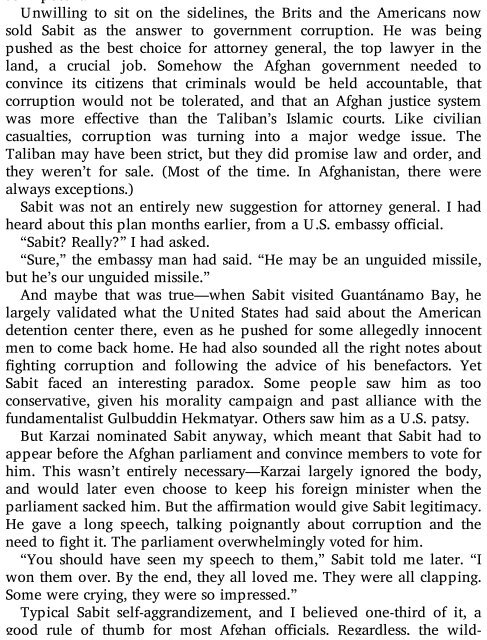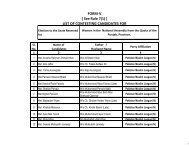the_taliban_shuffle_-_kim_barker
the_taliban_shuffle_-_kim_barker
the_taliban_shuffle_-_kim_barker
Create successful ePaper yourself
Turn your PDF publications into a flip-book with our unique Google optimized e-Paper software.
Unwilling to sit on <strong>the</strong> sidelines, <strong>the</strong> Brits and <strong>the</strong> Americans now<br />
sold Sabit as <strong>the</strong> answer to government corruption. He was being<br />
pushed as <strong>the</strong> best choice for attorney general, <strong>the</strong> top lawyer in <strong>the</strong><br />
land, a crucial job. Somehow <strong>the</strong> Afghan government needed to<br />
convince its citizens that criminals would be held accountable, that<br />
corruption would not be tolerated, and that an Afghan justice system<br />
was more eective than <strong>the</strong> Taliban’s Islamic courts. Like civilian<br />
casualties, corruption was turning into a major wedge issue. The<br />
Taliban may have been strict, but <strong>the</strong>y did promise law and order, and<br />
<strong>the</strong>y weren’t for sale. (Most of <strong>the</strong> time. In Afghanistan, <strong>the</strong>re were<br />
always exceptions.)<br />
Sabit was not an entirely new suggestion for attorney general. I had<br />
heard about this plan months earlier, from a U.S. embassy official.<br />
“Sabit? Really?” I had asked.<br />
“Sure,” <strong>the</strong> embassy man had said. “He may be an unguided missile,<br />
but he’s our unguided missile.”<br />
And maybe that was true—when Sabit visited Guantánamo Bay, he<br />
largely validated what <strong>the</strong> United States had said about <strong>the</strong> American<br />
detention center <strong>the</strong>re, even as he pushed for some allegedly innocent<br />
men to come back home. He had also sounded all <strong>the</strong> right notes about<br />
ghting corruption and following <strong>the</strong> advice of his benefactors. Yet<br />
Sabit faced an interesting paradox. Some people saw him as too<br />
conservative, given his morality campaign and past alliance with <strong>the</strong><br />
fundamentalist Gulbuddin Hekmatyar. O<strong>the</strong>rs saw him as a U.S. patsy.<br />
But Karzai nominated Sabit anyway, which meant that Sabit had to<br />
appear before <strong>the</strong> Afghan parliament and convince members to vote for<br />
him. This wasn’t entirely necessary—Karzai largely ignored <strong>the</strong> body,<br />
and would later even choose to keep his foreign minister when <strong>the</strong><br />
parliament sacked him. But <strong>the</strong> affirmation would give Sabit legitimacy.<br />
He gave a long speech, talking poignantly about corruption and <strong>the</strong><br />
need to fight it. The parliament overwhelmingly voted for him.<br />
“You should have seen my speech to <strong>the</strong>m,” Sabit told me later. “I<br />
won <strong>the</strong>m over. By <strong>the</strong> end, <strong>the</strong>y all loved me. They were all clapping.<br />
Some were crying, <strong>the</strong>y were so impressed.”<br />
Typical Sabit self-aggrandizement, and I believed one-third of it, a<br />
good rule of thumb for most Afghan ocials. Regardless, <strong>the</strong> wild-



